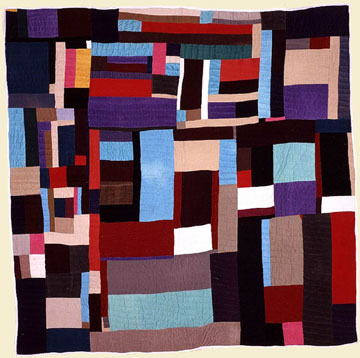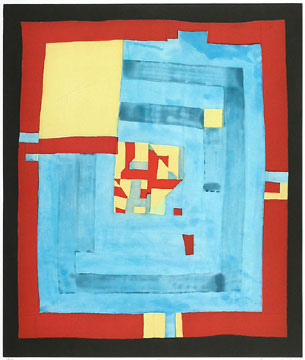

| For more information about this article or gallery, please call the gallery phone number listed in the last line of the article, "For more info..." |
July Issue 2006
Jerald Melberg Gallery in Charlotte, NC, Features Quilts and Prints from Gee's Bend
Jerald Melberg Gallery in Charlotte, NC, will present the exhibition, The Quilts and Prints of Gee's Bend, featuring works by Mary Lee Bendolph and Louisiana Bendolph, two of the internationally acclaimed Gee's Bend quilters. The exhibit will be on view from July 8 through Sept. 2, 2006.
The women of Gee's Bend, a small rural community in southwest Alabama, are celebrated for making exquisite abstract quilts. Based on skills and an aesthetic passed down through several generations, the quilts have been highly praised for these raw beauty, bold geometry and sophistication color sense. The New York Times called the quilts "some of the most miraculous works of modern art America has produced."
 Mary Lee Bendolph
Mary Lee Bendolph
Mary Lee and her daughter-in-law Louisiana Bendolph, both native Gee's Bend quilters, have created colorful etchings that reflect the same great quilting tradition. Each of the prints is the translation of an actual quilt sewn by one of the Bendolph women. Working collaboratively with master printers, Mary Lee and Louisiana were able to capture in amazing detail the stitching and textures of the used and worn fabrics in the original quilts.
Mary Lee bendolph comes from a strong tradition of quiltmaking. She was born in 1935 in Gee's Bend, a small rural community enclosed on three sides by a sharp bend in the Alabama River. Its geographical isolation has left it largely separate from the rest of the world since the early 1800s, when a planter named Joseph Gee first staked his claim and began growing cotton crops with the help of black slaves. After emancipation, those slaves became tenant farmers on the land. Then in 1937, the US government bought much of Gee's Bend and sold it to the former slaves and their descendents. As a result, the community has enjoyed unusual continuity for generations.
The women of Gee's Bend have been gathering regularly to make quilts, influencing each other and developing a shared style of improvisation that upends the usual quilting conventions, while also developing their own unique artistic voices within that tradition. Often they worked without patterns, thriftily recycling worn-out clothing and letting the quirks of the material determine the form. In the late 1960s and 1970s their unorthodox patterns and vivid colors brought the tradition of the community to national attention, In 2002-2003, The Museum of Fine Arts, Houston and the Whitney Museum of American Art exhibited a wide selection of quilts made between the late thirties and 2000. A new exhibition of quilts opened this June at the Museum of Fine Arts, Houston and will travel to seven additional museums, ending its tour at the Philadelphia Museum of Art in 2008.
Mary Lee is one of the keepers of Gee's Bend's memories. She knows everybody there, and everybody knows her. During the Civil Rights demonstrations in 1965, she marched with Martin Luther King, Jr. One day she watched in awe while he drank from a "whites only" fountain in Selma - then she took a taste herself. Her quilting style displays the same boldness, drawing on influences from the extended families of both her mother's and mother-in-law's families. She works rapidly, putting together big geometric shapes and bright hues. Used clothes are her preferred materials, everything from old shirts to blue jeans, corduroy pants to polyester leisure suits.
Paulson Press invited Mary Lee and her daughter-in-law Louisiana Bendolph, also an accomplished quilt maker from Gee's Bend, to come to Berkeley to make a series of prints. The pair spent two weeks at the press in June 2005, bringing with them some "pieces" they has already sewn at home. During her visit, Mary Lee worked with clothing from the local Goodwill and Out of the Closet stores to create her compositions. Though life in Gee's Bend has greatly improved in recent years, and Ms. Bendolph has access to whatever materials she now chooses, she still prefers to work with previously worn clothes as they "have the love of the people who have worn them."
Working with master printers Pam Paulson and Renee Bott, Mary Lee decided which of her quilts would become etchings - two were quilts from home, the other four from the sessions at Paulson Press. Using a technique called softground, each quilt was laid on a copper plate coated with beeswax to produce an impression of the quilt. Next, the soft ground was etched in acid, transferring the impression of the quilt piece to the copper plate and recording all the seams, textures, and nuances of each different fabric. Mary Lee hand-worked the copper plates using the spitbite method, wielding a brush to paint a mixture of nitric acid, gum arabic, and water directly on the plate to create a watercolor effect. Once all of the plates had been made they were printed together to produce the final image. In the transition from a beautiful and functional object to a fine art print, the highly sophisticated abstract patterns are brought into sharper focus.
Louisiana Bendolph also
spent two weeks working in the Paulson Press studio where she
created six vibrant etchings. She began by sewing numerous small
quilts, which became the basis for the etchings. The six completed
prints navigate the new territory by transferring the patterns
and designs of original quilts into the materials of the original
print: color softground; aquatint; and spitbite aquatint. All
images embody the improvisational style that the Gee's Bend quilters
are known for: Their linear and asymmetrical forms and the interplay
between contemporary sensibilities and African textiles. Louisiana Bendolph
Louisiana Bendolph
Louisiana Bendolph is part of the new generation of Gee's Bend quilters. For hundreds of years, women in Gee's Bend, a rural black community in Wilcox, Alabama, have been handing down a unique guilt-making legacy. Largely isolated by a bend in the Alabama River on three sides, the community has its own approach to quilt making, born out of necessity (the houses lacked central heating), thrifty reuse of worn-out clothing, and creative improvisation. Louisiana draws on the asymmetrical forms and vivid colors of the Gee's Bend tradition, adding a greater emphasis on variation than on repetition and a playful approach to space that gives her work a sculptural feel. Breaking with tradition, Louisiana prefers to work with new fabrics rather than used clothing though she will, on occasion, work with material from old clothes.
Louisiana is the daughter-in-law of Mary Lee bendolph. Born in Gee's Bend in 1960, Louisiana grew up watching her mother and other family members making quilts. At age 20 she married Mary Lee's son Albert, and the two moved to Mobile, AL, in the early 1980s, where their apartment was too small to leave much room for piecing quilts. As a result, she produced only a few during this period. But when The Quilts of Gee's Bend exhibition opened in Sept. 2002 at the Museum of Fine Arts, Houston, she was deeply moved to see the quilts of her community on display - particularly those of Annie E. Pettway, her great-grandmother. Afterward, Louisiana resumed making quilts.
Louisiana Bendolph will also be featured in the upcoming exhibition, Gees Bend: The Architecture of the Quilt, which opens at the Museum of Fine Arts, Houston.
For further information check our NC Commercial Gallery listings, call the gallery at 704/365-3000 or at (www.jeraldmelberg.com).
Carolina Arts is published monthly by Shoestring Publishing
Company, a subsidiary of PSMG, Inc.
Copyright© 2006 by PSMG, Inc., which published Charleston
Arts from July 1987 - Dec. 1994 and South Carolina Arts
from Jan. 1995 - Dec. 1996. It also publishes Carolina Arts
Online, Copyright© 2006 by PSMG, Inc. All rights reserved
by PSMG, Inc. or by the authors of articles. Reproduction or use
without written permission is strictly prohibited. Carolina
Arts is available throughout North & South Carolina.